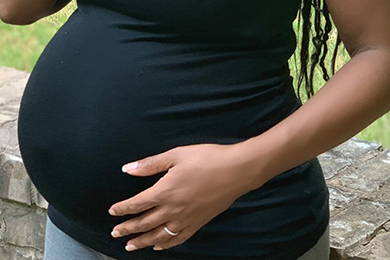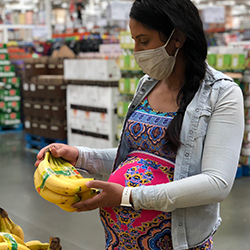Recommendations for Fully Vaccinated People
COVID-19 Homepage
Pregnant and Recently Pregnant People
At Increased Risk for Severe Illness from COVID-19
- To maximize protection from variants and prevent possibly spreading the virus to others, wear a mask indoors in public in areas with a high COVID-19 Community Level. People who are pregnant or have other conditions that could put them at higher risk for severe illness should speak with their healthcare provider about wearing a mask in public indoor spaces at the medium COVID-19 Community Level.
- Although the overall risks are low, if you are pregnant or were recently pregnant, you are more likely to get very sick from COVID-19 compared to people who are not pregnant. Additionally, if you have COVID-19 during pregnancy, you are at increased risk of complications that can affect your pregnancy and developing baby.
- Having certain underlying medical conditions, and other factors, including age, can further increase the risk for getting very sick from COVID-19 during or recently after pregnancy (for at least 42 days following end of pregnancy).
- People who are pregnant or recently pregnant and those who live with or visit them should take steps to protect themselves from getting sick with COVID-19.
Increased Risk of Severe Illness

If you are pregnant or were recently pregnant, you are more likely to get severely ill from COVID-19 compared to people who are not pregnant. Pregnancy causes changes in the body that could make it easier to get very sick from respiratory viruses like the one that causes COVID-19. These changes in the body can continue after pregnancy.
Severe illness means that a person with COVID-19 may need:
- Hospitalization
- Admission into an intensive care unit (ICU)
- A ventilator or special equipment to help them breathe
People with COVID-19 who become severely ill can die. See why pregnancy is included in the list of underlying medical conditions that increase a person’s risk of severe illness from COVID-19.
Certain factors can increase risk
Other factors can further increase the risk for getting very sick from COVID-19 during or recently after pregnancy, such as:
- Having certain underlying medical conditions
- Being older than 25 years
- Living or working in a community with high numbers of COVID-19 cases
- Living or working in a community with low levels of COVID-19 vaccination
- Working in places where it is difficult or not possible to avoid contact with people who might be sick with COVID-19
- Being part of some racial and ethnic minority groups, which have been put at increased risk of getting sick from COVID-19 because of the health inequities they face
Effect on Pregnancy Outcomes
People with COVID-19 during pregnancy are more likely to experience complications that can affect their pregnancy and developing baby compared to people without COVID-19 during pregnancy. For example, COVID-19 during pregnancy increases the risk of delivering a preterm (earlier than 37 weeks) or stillborn infant. People with COVID-19 during pregnancy may also be more likely to have other pregnancy complications.
See the latest data on birth and infant outcomes among pregnant women with COVID-19.
COVID-19 Vaccines and Pregnancy
COVID-19 vaccination is recommended for everyone aged 6 months and older, including people who are pregnant, breastfeeding, trying to get pregnant now, or might become pregnant in the future. This recommendation includes getting boosters when it is time to get one. If you have questions about getting vaccinated, talking with your healthcare professional might help, but is not required.
If you are pregnant and have questions about COVID-19 vaccine
If you would like to speak to someone about COVID-19 vaccination during pregnancy, you can contact MotherToBaby. MotherToBaby experts are available to answer questions in English or Spanish by phone or chat. The free and confidential service is available Monday–Friday 8am–5pm (local time). To reach MotherToBaby:
- Call 1-866-626-6847
- Chat live or send an email MotherToBabyexternal iconExternal
Getting vaccinated prevents severe illness, hospitalizations, and death. People who have not received a COVID-19 vaccine should get vaccinated as soon as possible and continue masking. To maximize protection from variants and prevent possibly spreading the virus to others, people who are up to date with their COVID-19 vaccines should wear a mask indoors in public in areas with a high COVID-19 Community Level. With the emergence of variants, this is more urgent than ever. Learn more about what you can do when you have been fully vaccinated when you are up to date with your COVID-19 vaccines.
Reducing Your Risk of Getting COVID-19

It is especially important for people who are or were recently pregnant, and those who live or visit with them, to take steps to protect themselves and others from getting COVID-19.
Limit in-person interactions with people who might have been exposed to COVID-19, including people within your household, as much as possible. If you or someone in your household is sick with COVID-19, follow guidance for isolation.
Important Ways to Slow the Spread of COVID-19
- Get vaccinated and stay up to date on your COVID-19 vaccines. Find a vaccine.
- Know when to wear a high-quality mask to help protect yourself and others.
- Avoid crowds and poorly ventilated indoor spaces.
- Test to prevent spread to others.
- Avoid contact with people who have suspected or confirmed COVID-19.
- Wash your hands often with soap and water. Use hand sanitizer if soap and water aren’t available.
Staying Healthy During and After Your Pregnancy
Keep all of your healthcare appointments during and after pregnancy. Visit with your healthcare provider for all recommended appointments. If you’re concerned about going to your appointments in person because of COVID-19, ask your healthcare professional what steps they are taking to protect patients from COVID-19, or ask about telemedicine options. If you need help finding a healthcare professional, contact your nearest hospital, clinic, community health center,External or health department.
- Talk to your healthcare professional about how to stay healthy and take care of yourself and the baby.
- Ask any questions you have about the best place to deliver your baby. Delivering a baby is always safest under the care of trained healthcare professionals.
- You should also talk to your healthcare professional if you think you are experiencing depression during or after pregnancy.
- Get recommended vaccines during pregnancy. These vaccines can help protect you and your baby.
- Get a flu vaccine every year. Others living in your household should also get vaccinated to protect themselves and you.
- Get the Tdap vaccine to protect your baby against whooping cough, which can have similar symptoms to COVID-19. CDC recommends all pregnant people receive a Tdap vaccine during each pregnancy. In addition, everyone who is around the baby should be up to date with their whooping cough vaccine.
- Call your healthcare professional if you have any concerns about your pregnancy, if you get sick, or if you think that you may have COVID-19.
- Do not delay getting emergency care because of worries about getting COVID-19. Emergency departments have steps in place to protect you from getting COVID-19 if you need medical care.
- If you need emergency help, call 911 right away. If someone else is driving you to the emergency department, call the emergency facility while you are on the way. If you must drive yourself, call before you start driving.
- Tell them that you are pregnant or were recently pregnant and are having an emergency.
- Seek medical care immediately if you experience any urgent maternal warning signs and symptoms (for example, headache that won’t go away, dizziness, fever, severe swelling of hand, face, arm or leg, trouble breathing, chest pain or fast-beating heart, severe nausea and throwing up, or vaginal bleeding or discharge during or after pregnancy). These symptoms could indicate a potentially life-threatening complication.
If You Are Sick or Think You Were Exposed to COVID-19
If you have any symptoms of COVID-19, contact your healthcare professional within 24 hours, and follow steps for when you feel sick.
If you are diagnosed with COVID-19, learn about breastfeeding and caring for newborns when the mother has COVID-19. Current evidence suggests that breast milk is not likely to spread the virus to babies.
Related Research
- Zambrano LD, Ellington S, Strid P, et al. Update: Characteristics of Symptomatic Women of Reproductive Age with Laboratory-Confirmed SARS-CoV-2 Infection by Pregnancy Status — United States, January 22–October 3, 2020. MMWR Morb Mortal Wkly Rep 2020;69:1641–1647. DOI: 10.15585/mmwr.mm6944e3.external icon
- Allotey, J., et al., Clinical manifestations, risk factors, and maternal and perinatal outcomes of coronavirus disease 2019 in pregnancy: living systematic review and meta-analysis. BMJ, 2020. 370: p. m3320. doi: 10.1136/bmj.m3320Externalexternal icon
- Galang RR, Newton SM, Woodworth KR, et al. Risk factors for illness severity among pregnant women with confirmed SARS-CoV-2 infection – Surveillance for Emerging Threats to Mothers and Babies Network, 22 state, local, and territorial health departments, March 29, 2020 -January 8, 2021. Clinical Infectious Diseases, 2021; ciab432. doi:1093/cid/ciab432External
- Ko JY, DeSisto CL, Simeone RM, et al. Adverse pregnancy outcomes, maternal complications, and severe illness among U.S. delivery hospitalizations with and without a COVID-19 diagnosis [published online ahead of print, 2021 May 12]. Clin Infect Dis. 2021;ciab344. doi:10.1093/cid/ciab344external iconExternal
- Woodworth KR, Olsen EO, Neelam V, et al. Birth and Infant Outcomes Following Laboratory-Confirmed SARS-CoV-2 Infection in Pregnancy — SET-NET, 16 Jurisdictions, March 29–October 14, 2020. MMWR Morb Mortal Wkly Rep 2020;69:1635–1640. DOI:10.15585/mmwr.mm6944e2
- DeSisto CL, WallaceB, Simeone RM, et al. Risk for Stillbirth Among Women With and Without COVID-19 at Delivery Hospitalization — United States, March 2020–September 2021. MMWR Morb Mortal Wkly Rep 2021;70:1640-1645. DOI: 15585/mmwr.mm7047e1
- external icon
More Information